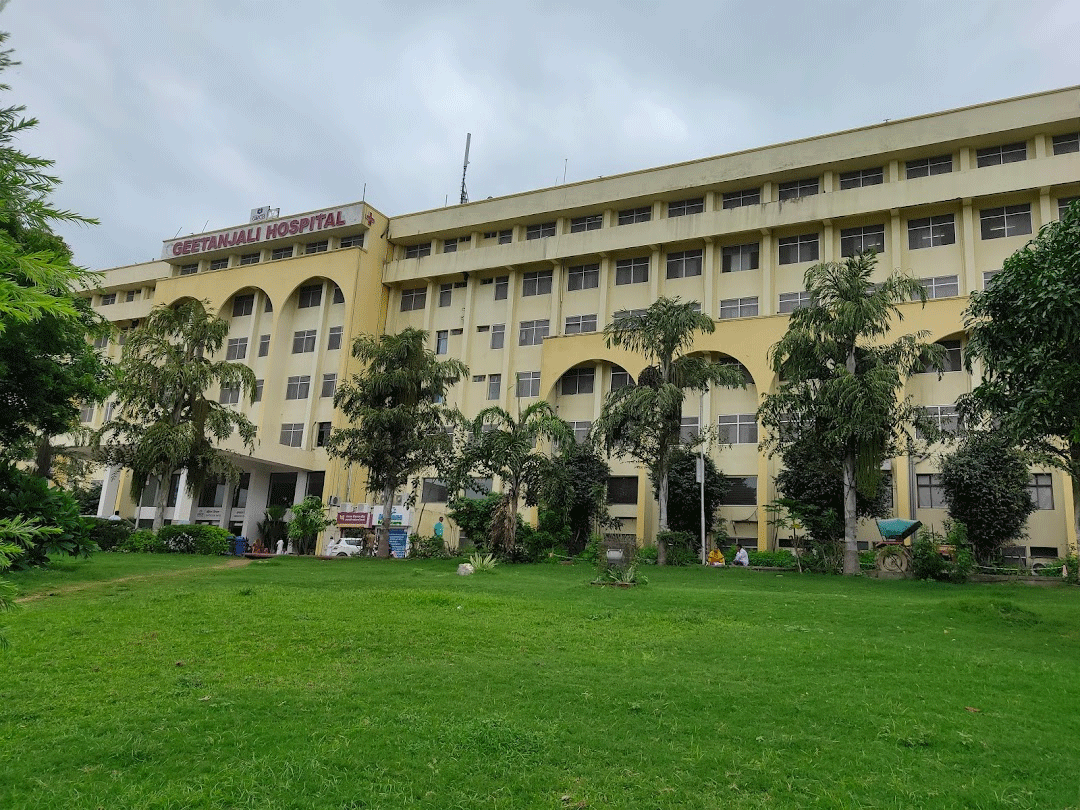
Geetanjali Medical College & Hospital,Udaipur
Geetanjali Medical College And Hospital, Udaipur was established as a part of the Geetanjali University, Udaipur. The college was initially started with an intake of 150 students. Later, other postgraduate, diploma and superspeciality programmes were also introduced. The college is recognised by the Medical Council of India (MCI). The campus covers an area of 35 acres providing various academic and infrastructural facilities to the students and faculty members of the institute including canteen, transportation, labs, lecture theatres, central library, sports, classrooms, auditorium, hostels, computer lab, cafeteria, gym, health centre, hospital etc. The Geetanjali Hospital is also well equipped with advanced treatment facilities and equipment and covers various departments including M.I.C.U., P.I.C.U., N.I.C.U., S.I.C.U, Cardiac Care Unit, Neuro ICU, High Dependency Unit and Burn ICU. Also, the emergency unit of the hospital functions 24z7 for providing any kind of emergency medical service to patients.
Email: info@careers360.com
Magazine Subscription
If you are currently a subscriber or wish to start subscribing, reach us at:
Email: yourhelpline@careers360.com
Tel: 0124-6666466
DM - Neurology
એસએમએસ મેડિકલ કોલેજ, જયપુર
Sure, let's talk about Neurology. Neurology is a medical specialty that focuses on the diagnosis and treatment of disorders affecting the nervous system. This includes the brain, spinal cord, peripheral nerves, and muscles. Neurologists are medical doctors who specialize in neurology. Here are some key aspects of neurology:
Neurological Disorders:
- Neurologists diagnose and treat a wide range of neurological disorders, including but not limited to:
- Stroke
- Epilepsy
- Multiple Sclerosis (MS)
- Parkinson's disease
- Alzheimer's disease
- Migraines and other headache disorders
- Neuropathies
- Movement disorders
- Neurogenetic disorders
- Neurologists diagnose and treat a wide range of neurological disorders, including but not limited to:
Neurological Examination:
- Neurologists conduct thorough neurological examinations to assess a patient's sensory function, motor skills, coordination, reflexes, and cognitive abilities.
Diagnostic Tools:
- Neuroimaging techniques such as MRI and CT scans help in visualizing the structure of the brain and spinal cord.
- Electrophysiological studies, like EEG (Electroencephalogram) and EMG (Electromyogram), assess electrical activity in the nervous system.
Stroke Management:
- Neurologists play a critical role in the management of stroke, both in acute care and long-term prevention.
Epilepsy Treatment:
- Managing epilepsy involves medication management, lifestyle adjustments, and, in some cases, surgical interventions.
Movement Disorders:
- Neurologists specialize in the diagnosis and treatment of movement disorders such as Parkinson's disease, essential tremor, and dystonia.
Headache and Pain Management:
- Addressing various types of headaches, including migraines, tension-type headaches, and cluster headaches, is a common part of neurology practice.
Memory and Cognitive Disorders:
- Neurologists evaluate and manage conditions affecting memory and cognitive function, including Alzheimer's disease and other forms of dementia.
Neuromuscular Disorders:
- Disorders affecting the muscles and peripheral nerves fall under the expertise of neurologists.
Multiple Sclerosis (MS) Management:
- Neurologists are involved in the diagnosis and long-term management of MS, an autoimmune disorder affecting the central nervous system.
Collaboration with Other Specialties:
- Neurologists often collaborate with other medical specialties, including neurosurgery, psychiatry, rheumatology, and rehabilitation medicine.
Research and Advancements:
- Neurologists contribute to ongoing research to better understand neurological conditions and develop new treatments.
Telemedicine:
- With advancements in technology, neurologists may use telemedicine for remote consultations, especially for follow-up appointments or managing chronic conditions.
If you have specific questions about neurology or if there's a particular aspect you'd like more information on, feel free to ask.
MD - Anaesthesiology
The purpose of PG education is to create specialists who would provide high quality health care and advance the cause of science through research & training. A post graduate specialist having undergone the required training in anesthesiology should be able to recognize the health needs of the community. He or she should be competent to handle effectively medical problems and should be aware of the recent advances pertaining to his/her specialty. She/he should be highly competent anesthesiologist with broad range of skills that will enable him/her to practice anesthesiology independently. The PG student should also acquire the basic skills in teaching of medical/para-medical students. She/he is also expected to know the principles of research methodology and modes of consulting library. She/he should attend conferences, workshops and CMEs regularly to upgrade his/her knowledge. The purpose of this document is to provide teachers and learners illustrative guidelines to achieve defined outcomes through learning and assessment. This document was prepared by various subject-content specialists. The Reconciliation Board of the Academic Committee has attempted to render uniformity without compromise to purpose and content of the document. Compromise in purity of syntax has been made in order to preserve the purpose and content. This has necessitated retention of “domains of learning” under the heading “competencies”
MD - Bio-Chemistry
MD - Dermatology , Venereology & Leprosy
MD - Forensic Medicine/Forensic Medicine & Toxicology
MD - General Medicine
MD - Microbiology
MD - Paediatrics
MD - Pathology
MD - Pharmacology
MD - Physiology
MD - Psychiatry
M. D. in Psychiatry is a Clinical Speciality course.
Doctor of Medicine in Psychiatry explores the major psychiatric syndromes like psychotic, mood and anxiety disorders, psychological effects of physical diseases, the doctor-patient relationship, human development, patient interviewing, and ethical issues in medicine. It is a three-year postgraduation course and can be pursued by any MBBS holders from a University recognized by Medical council of India. Most psychiatrists practice general psychiatry. Sub-specialization in Child and Adolescent Psychiatry, Addiction Medicine, and Geriatric psychiatry can be conducted after M. D. in Psychiatry.
MD - Radio Diagnosis/Radiology
MD - Radiotherapy/ Radiation Oncology
MD - Social & Preventive Medicine / Community Medicine
MD - Tuberculosis & Respiratory Diseases / Pulmonary Medicine
MD/MS - Anatomy
MD/MS - Obstetrics & Gynaecology
MD/MS - Ophthalmology
MS - ENT
MS - General Surgery
MS - Orthopaedics
- Log in to post comments
- 87 views
